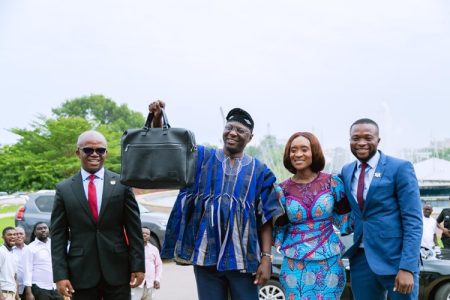Government has spent GH¢9.9 billion on the Free Senior High School (SHS) policy since its implementation in September 2017.
This initiative has benefited 5.7 million young people, many of whom might not have had the opportunity to pursue secondary education.
Speaking during the presentation of the 2024 Mid-Year Budget Review in Parliament, Dr. Mohammed Amin Adam, Minister of Finance highlighted the government’s complementary efforts in enhancing educational infrastructure and resources.
“To complement the Free SHS policy, the Government has also provided facilities under the Technical and Vocational Education and Training (TVET) programme, empowering young people with employable skills. For the 2023-2024 academic year, 168,000 students have been enrolled,” he stated.
Dr. Adam further mentioned that the government is constructing 10 STEM schools and 10 STEM centres across the country, distributing 900,000 tablets to secondary school students, and focusing on improving the quality of education. He noted that student performance in the West African Senior School Certificate Examination (WASSCE) in 2023 was the best since 2015.
Additionally, the government has disbursed about GH¢38 million as Capitation Grant for the first half of 2024, ensuring schools have adequate resources to provide quality education. Funds have also been released for feeding grants to all public special schools for the 2024 academic year, supporting vulnerable students.
“The capitation grant has increased from GH¢5 in 2016 to GH¢15 in 2024,” Dr. Adam added, emphasizing the government’s commitment to improving educational funding.
Article 25(1) of 1992 constitution
The Free SHS programme, introduced in the 2017-18 academic year, aligns with Article 25(1) of Ghana’s constitution, which guarantees every Ghanaian the right to “equal educational opportunities and facilities.”
The constitution further mandates that “secondary education in its different forms, including technical and vocational education, shall be made generally available and accessible to all by every appropriate means, and in particular, by the progressive introduction of free education.”
SDG Goal 4
In line with Goal 4 of the United Nations Sustainable Development Goals (SDGs), which aims to “ensure that all girls and boys complete free equitable and quality primary and secondary education leading to relevant and effective learning outcomes” by 2030, the government has prioritized making education free from basic to secondary levels to provide more children with access to quality education.
What is covered?
The Free SHS programme provides students with core textbooks, supplementary readers, notebooks, exercise books, and, where applicable, free drawing instruments at no cost.
The government covers all fees for students admitted to public senior and vocational high schools, ensuring broad access to education.
Free SHS bill
Seven years after the programme’s introduction, the government plans to present a bill to parliament to give legislative backing to the Free SHS initiative, a step viewed as essential to reconciling the policy imperatives of free education with current political dynamics.
Unique opportunity
This major policy initiative offers a unique opportunity to study the impact and implementation of secondary school fee abolition in real time, reflecting the government’s commitment to the constitutional imperative of providing free and equitable education for all Ghanaians.
- Galamsey: Mahama govt revives jail Ghanaians, deport foreigners policy - 4 April 2025
- E-Levy refund to take effect on April 7 - 4 April 2025
- GRIDCo restores power following nationwide system disturbance - 4 April 2025

